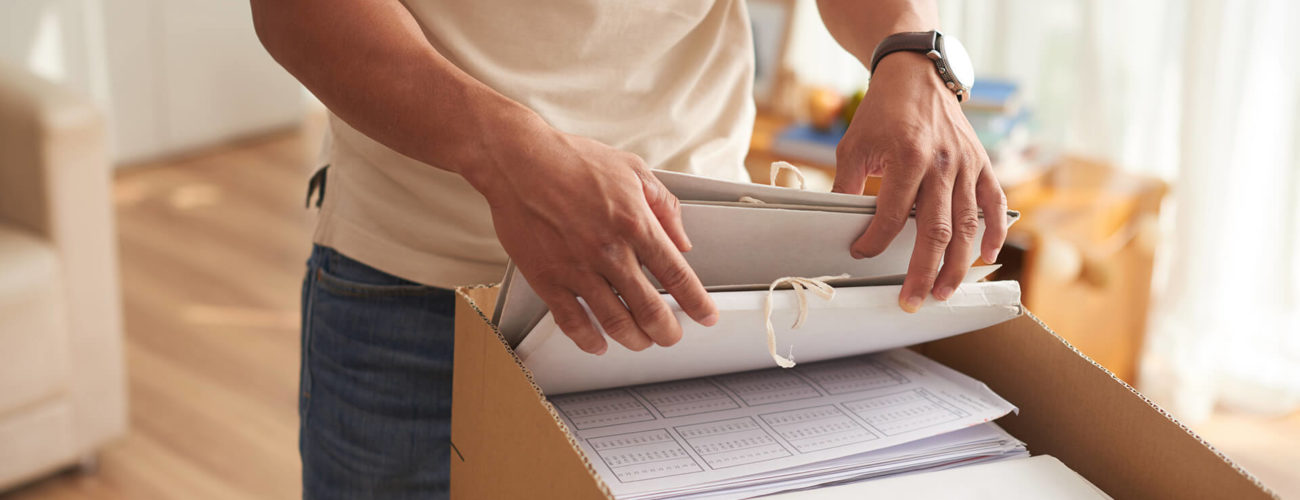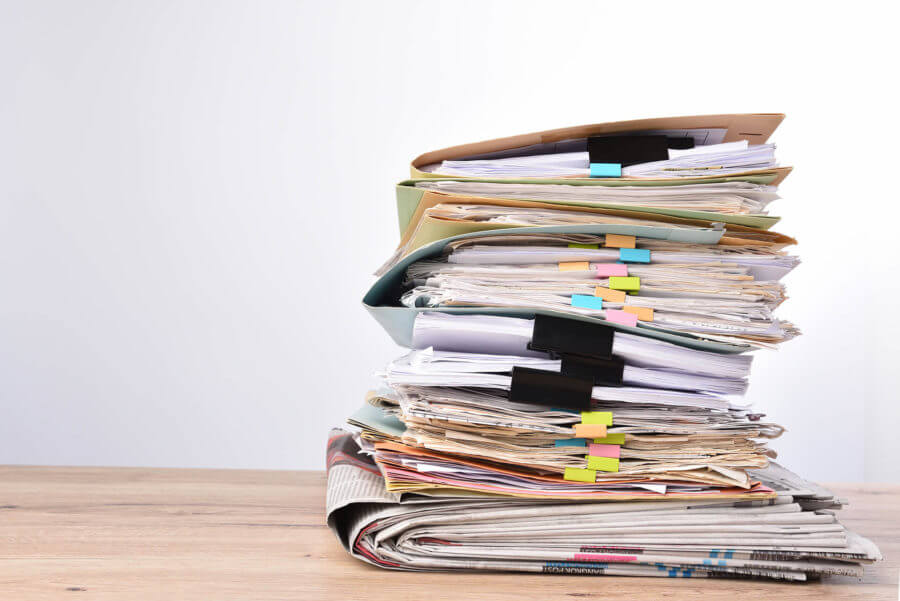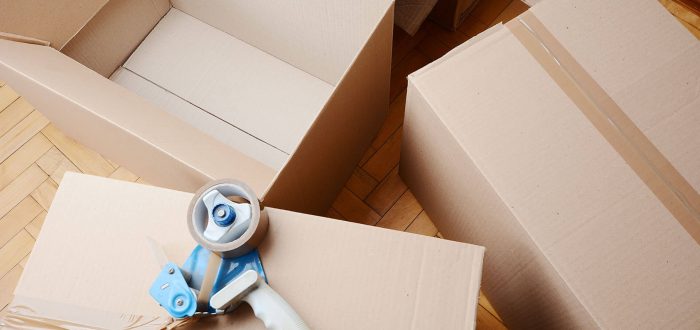

How to Organize Important Documents at Home and Have Your Paperwork Ready for Cross Country Moving
Posted in How-to,Moving Essentials,Moving Tips & Tricks on May 24, 2021
When it comes to long-distance moving, a painstaking approach to learning how to organize important documents at home is the only one proven right. Even though it might be dreadfully boring at times, the more careful you prepare the lower the number of problems that can cause panic and distress when you least want them.
Chances are slim that all of the paperwork you have is already in order, not to mention heaps of magazines covered in dust and probably scattered all over the place. Creating a filing system that works for you will also let you handle the relocation process in a peaceful and timely manner. To have a smooth transition, we rounded up some of the most important steps.
Collect the Records in One Place
If wondering how to plan your move without drowning in papers or losing important files, there are many moving hacks you can use. Start by locating and gathering them in one place, so you can be more effective and efficient when sorting the pile. Check the whole household inside out and look for a forgotten paper everywhere possible: desks, closets, each and every drawer, nightstand, kitchen counter, under the beds, whatever crosses your mind. Do a sweep of other common places, your old purses, and work bags. You never know what’s left in there. For a successful move, a whole-house cleaning is an inevitable step on your to-do list.

Find the Right Organizational Strategy
How to keep important documents organized is one of the key priorities when planning your move, which is why creating a new system should be among the first things to tackle. One of the ways to go about it is creating a moving binder. It will ensure quick access to the document needed and help you move efficiently. Recognizing how to keep your important papers safe and findable is having more than half of the job done. With cross-country moving tips like this, even the next tax season will be a piece of cake.
Organize Your Personal Records
Consider these moving essentials, no matter if you’re relocating to another state alone or with a family. If going together, have these for each family member. Keep in mind that personal records are the only records that should be saved forever:
- Passport
- Birth and marriage certificate,
- Social security cards,
- Divorce documentation,
- Paternity documentation,
- Military service records,
- Will and power of attorney,
- Burial site information.
If relocating with pets as well, it’s crucial to have their essential papers such as veterinary and vaccine records with you. Don’t forget to put it in this category, too.
Health Records
Moving cross-country means transporting your prescriptions and medications to a new state. This is not exactly as simple as locating the nearest pharmacy, so be sure to have all of the necessary documentation with you:
● Prescriptions,
● Medical bills and receipts,
● Healthcare directives,
● Health insurance benefits plan,
● Flexible spending arrangement,
● Life insurance policies.
Store your paid and undisputed bills for a year, in case you are asked for proof that you’ve paid for the provided medical services.
Property Paperwork
If you have a small apartment idea, putting your property records in order should be on your new apartment checklist. These include:
● Mortgage documentation and property deeds,
● Home improvement projects receipts,
● Tax payment information,
● Insurance policies.
It won’t hurt if you keep these with you as long as your property, and then add another ten years to it.
Bank Account and Tax Records
All your relevant financial activities and information should be kept within this category:
● Bank statements,
● Tax returns,
● Tax deduction records,
● Investment records,
● Loan records,
● Credit card statements.
Handle your financial files with care. They are one of the cornerstones of every household, which is the main reason to keep them safe for several years. Bank statements for at least one, while you never know when you might need your tax records. Better be safe than sorry by keeping them neat for seven years minimum.
Car Records
Your car history covers a range of things, and it’s crucial to save them for at least a year:
- Payment records,
- Loan information,
- Maintenance records.
Pay special attention to these if you’re deciding on transporting your car and searching for reliable car shipping services. Calculating how much movers cost will largely depend on the long-distance moving services you require.

What About the Kids’ Paperwork?
Knowing how to plan a move to another city with kids in a stress-free manner implies many nitty-gritty well-timed details and packing tips. Grouping their school records – diplomas, school report cards, awards, and some of the essays – is an essential preparatory step. If making copies, bear in mind that only transcripts provided in a sealed envelope will be accepted as a permanent record. Also, be certain they have all the necessary medical documentation sorted out. Whatever your reasons to move are, consider these mandatory when moving across the country.

How to Organize Important Papers: Spring Clean Time
When you’re done dividing your paperwork into categories, it’s time to think about what to keep and what to toss away. If you don’t want to haul all of your belongings with you, doing a move-out cleaning before hiring cross-country movers and scheduling packing services or any of the moving services will not only help you simplify the whole process but make more room in your moving budget, as well. Don’t be discouraged, there are many successful ways to get rid of the clutter you’ve been accumulating for years, not to mention how much easier it will be to put together a household inventory list. This is a good time to consider carefully whether you need all the paper-based belongings with you or if there’s a pile that can go with some of the remaining items to storage space.
Household Recycling Collection
Yes, we all have one. Information of all sorts collected over years, from magazines, periodicals, brochures to advertising leaflets, envelopes, and random junk. Even though it might seem overwhelming, you certainly won’t be wrong if you recycle a large portion of it. Otherwise, thinking about how to pack a moving truck in one go will surely be a million-dollar question.
Separate and Destroy Every Sensitive File You Don’t Need Anymore
Keeping confidential and sensitive information secured by not letting them fall into the wrong hands is also your responsibility when talking about how to organize documents, especially when it comes to the ones you no longer need. Whether you have your own shredder or going for shredding services, disposing of unwanted files the right way will only prevent the risk of identity theft. Mailed statements and bills are a treat for thieves, so be smart when getting rid of the ones you don’t have to keep.
Digitize Important Papers
When preparing for such a big move, one of the best long-distance moving tips you can find is converting each important paper into an electronic file. That way, you’ll be able to cut back on storage space and make them easily accessible. You can even consider an app like Evernote, to be more productive. However, some of your most important stuff should be kept in their original physical form forever, and converting them would only mean having a backup. On the other hand, there are files you can dispose of instantly after you digitize them. Make sure you know the difference between the two.

Create Storage Space
Once you’re done sorting through, you’re ready to start packing documentation for the move and figuring out where to store important documents. At this point, you can be as creative as you want, using color-coded binders, label markers, various types of file cabinets and boxes, and anything else you might like. Renting a safe deposit box or purchasing a fireproof file holder will help you avoid any unwanted stressful situations. No matter if you finally dared to relocate for love or to plan your office move thoroughly, being able to access your storage space will give you peace of mind.
Find a Good Spot in Your Home for Incoming Mail
If you’re wondering how to store important documents at home, providing a spot for incoming mail will surely be additional support to your filing system. This pile is not your friend unless you set a few rules at the very beginning: designating slots large enough for each item – from bills to magazines – that will help you file new papers into appropriate categories, and keeping a watchful eye on them before they get all jumbled up.
How to Organize Important Documents at Home: More Useful Tips
When dealing with large volumes and a variety of paperwork, it’s quite important to explore different ways to make a well-structured system. Eventually, you’ll find the one that works for you, but using these tips will help you get there faster:
- Design your labeling system with short descriptions,
- Time-stamp your files or sort them alphabetically,
- Find the most fitting filing cabinets,
- Use color coding to keep track easily.
Tidying up and organizing doesn’t mean you can’t be creative. On the contrary, check out the video below to learn how to make your own binders from scratch.
Ongoing Maintenance of Your File Storage
The effectiveness of your system largely depends on its maintenance. If you lose track of your records and allow categories to mix, expect to build it from scratch sometime soon. A much better idea is circling the calendar right now and scheduling regular maintenance. Reviewing your storage regularly, filing everything within the appropriate category, and purging it occasionally will keep your documentation organized in the long run.

Are You Ready for Your Long-Distance Move?
Sure, mail will keep coming, but you must keep on clearing it up, as well. Organizing important documents is indeed a time-consuming job but you owe it to yourself – finally being able to lay your hands on any info you might need. Once you’re done with it, you’ll have your papers organized in a way that works best for any of your future adventures. So take a deep breath and look around you: where is your passport?


